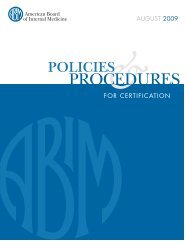The SRA Symposium - College of Medicine
The SRA Symposium - College of Medicine
The SRA Symposium - College of Medicine
Create successful ePaper yourself
Turn your PDF publications into a flip-book with our unique Google optimized e-Paper software.
Papers<br />
Virgin Territory: <strong>The</strong> Role <strong>of</strong> Research Administrators in Mentoring Junior Faculty<br />
Rebbecca A. Moen, MBA<br />
Duke University<br />
Office <strong>of</strong> Research Administration<br />
Suite 11103 Hock Plaza<br />
Box 2722<br />
2424 Erwin Road<br />
Durham, NC 27705<br />
Tel: 919-668-2242<br />
E-mail: Rebbecca.Moen@duke.edu<br />
Patricia Byrns, MD<br />
University <strong>of</strong> North Carolina at Chapel Hill<br />
Office <strong>of</strong> Research and Faculty Development<br />
243 MacNider<br />
CB# 7000<br />
Chapel Hill, NC 27599<br />
Tel: 919-843-7232<br />
E-mail: Patricia_Byrns@med.unc.edu<br />
Contributor: Meghan Maloney, Duke University<br />
Authors Note: <strong>The</strong> authors would like to thank the junior faculty in our programs for providing<br />
the qualitative data and Meghan Maloney for her critical assistance in reviewing the mentoring<br />
literature<br />
Abstract<br />
Most newly appointed faculty members at academic medical centers are insufficiently prepared to<br />
succeed in their new role. <strong>The</strong>y are required to publish research findings and compete for research<br />
funding, which may be an entirely new experience for them. In particular, the process <strong>of</strong> searching<br />
for, applying for, and managing extramural funding is new territory for these “grant virgins.” <strong>The</strong>re<br />
is substantial overlap in the needs <strong>of</strong> junior faculty and the knowledge that research administrators<br />
possess. Experience at our two institutions has taught us that research administrators have a great<br />
deal <strong>of</strong> knowledge and experience to <strong>of</strong>fer junior faculty, making the inclusion <strong>of</strong> a research administrator<br />
on a mentoring team a worthy endeavor. Networking, problem-solving, and obtaining<br />
research funding are examples <strong>of</strong> the skills research administrators can bring to the relationship.<br />
<strong>The</strong> success <strong>of</strong> research institutions relies on ensuring the success <strong>of</strong> its junior faculty in procuring<br />
research funding and in becoming independent investigators. Research administrators can play a<br />
significant role in helping junior faculty attain this goal.<br />
A Challenge for Junior Faculty<br />
Most newly appointed faculty members at academic medical centers are insufficiently prepared to<br />
succeed in their new role. Basic researchers have been trained in research methods and clinicians<br />
trained in patient care, but once an individual secures an academic faculty appointment, there<br />
are new requirements for gauging success. <strong>The</strong>se individuals must now juggle their time between<br />
teaching, administration, research, and perhaps clinical duties. <strong>The</strong>y are required to publish<br />
research findings and compete for research funding, which may be an entirely new experience for<br />
them.<br />
186 2005 <strong>Symposium</strong> Proceedings Book

















